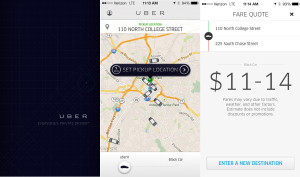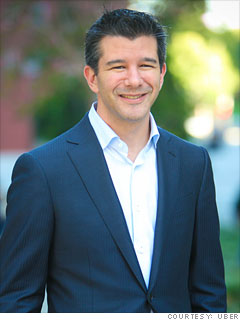Updated April 2, 2014: After Uber driver, Syed Muzzafar struck and killed six-year-old Sofia Liu on New Year’s Eve, the company has changed its position on providing insurance to its drivers. Uber’s original terms required that all Uber drivers have their own insurance in case of an accident. Following the death of Sofia Liu, there has been much debate over who has liability in such a situation. On March 14, Uber announced that it would expand coverage for its drivers in the event of an accident. “Uber will not cover drivers so long as they’re logged into the company’s smartphone app and available to accept a ride—even if there’s no passenger in the car when the accident occurs.”
This liability coverage will only apply if a driver’s personal insurance does not cover an incident. The coverage is up to $100,000 in bodily injury coverage and $25,000 in property damage.
On December 31, 2013, around 8:00 pm, Huan Kuang was walking home in San Francisco with her two young children, Anthony Liu, 5 years old, and Sofia Liu, 6 years old. The three approached an intersection and waited for the signal for them to walk. When the signal turned green, giving them the right-of-way, the trio began to cross in the crosswalk. As they were in the crosswalk, a vehicle, driven by Syed Muzzafar, turned right and collided with Huan Kuang, Anthony, and Sofia. Huang and Anthony were seriously injured, but for Sofia, the accident was fatal. Her mother and brother have now brought a wrongful death suit (pdf) against the driver, Muzzafar, as well as a wrongful death, negligent hiring and negligence with a motor vehicle, and emotional distress suit against Uber, the company for which the plaintiffs claim Muzzafar was working at the time of the collision.
According to Uber’s website, drivers are required only to be over 23-years-old with a personal license and insurance.

Uber is a technology company that has developed a service that allows anyone to request a ride via mobile app, text message, or the web. Upon request, Uber will send a driver to the customer. Some of these drivers are experienced professional chauffeurs with commercial licenses. Some are taxi drivers licensed and certified by the city in which they drive. According to Uber’s website, however, drivers are required only to be over 23-years-old with a personal license and insurance.
Uber’s drivers, who span across more than seventy cities worldwide, will arrive at one’s door within minutes of requesting them. Customers can track the arrival of their ride and will receive a text message when the driver arrives. Customers are required to provide a credit card before using the app, and that credit card on file is charged after the ride. Finally, customers will receive an email receipt detailing the trip.
Uber, in theory, seems ideal. It is quick, it is easy, and it is convenient. Uber also prides itself in being an easy way for drivers to make more money by “turning downtime into profits.”
But what happens when this profitable downtime takes a turn for the worst and people like Sofia Liu get hurt? Who is to blame?
“[UBER] HAS NO RESPONSIBILITY OR LIABILITY FOR ANY TRANSPORTATION SERVICES PROVIDED TO YOU BY SUCH THIRD PARTIES.”
Uber’s own terms of service attempt to absolve the company of all responsibility. The following portion appears in all capital letters:
“THE COMPANY DOES NOT PROVIDE TRANSPORTATION SERVICES, AND THE COMPANY IS NOT A TRANSPORTATION CARRIER. IT IS UP TO THE THIRD PARTY TRANSPORTATION PROVIDER, DRIVER, OR VEHICLE OPERATOR TO OFFER TRANSPORTATION SERVICES WHICH MAY BE SCHEDULED THROUGH USE OF THE APPLICATION OR SERVICE. THE COMPANY OFFERS INFORMATION AND A METHOD TO OBTAIN SUCH THIRD PARTY TRANSPORTATION SERVICES BUT DOES NOT AND DOES NOT INTEND TO PROVIDE TRANSPORATION SERVICES OR ACT IN ANY WAY AS A TRANSPORTATION CARRIER AND HAS NO RESPONSIBILITY OR LIABILITY FOR ANY TRANSPORTATION SERVICES PROVIDED TO YOU BY SUCH THIRD PARTIES.”
“IN NO EVENT SHALL THE COMPANY AND/OR ITS LICENSORS BE LIABLE TO ANYONE FOR ANY INDIRECT, PUNITIVE, SPECIAL, EXEMPLARY, INCIDENTAL, CONSEQUENTIAL, OR OTHER DAMAGES OF ANY TYPE OR KIND (INCLUDING PERSONAL INJURY, LOSS OF DATA, REVENUE, PROFITS, USE, OR OTHER ECONOMIC ADVANTAGE).”
Uber maintains that its terms of service completely eliminate any possible liability charges the company may face.
On the night of December 31, Muzzafar was working for Uber and was logged into the company’s app, but he did not have a passenger in the car at the time of the collision. Uber has since “deactivated” Muzzafar as a driver, but the issue of liability remains. Uber maintains that its terms of service completely eliminate any possible liability charges against the company.
Muzzafar was arrested for vehicular manslaughter and posted bail shortly after he was taken into custody. The State is still determining how to pursue the charge. Muzzafar’s attorney, Graham Archer, knew that a civil suit would be in the near future for his client. “It was expected by everyone involved. It is the next step for the family on their road to recovering from this tragedy,” said Archer.
Uber, on the other hand, has structured its company to avoid lawsuits such as this. Instead of “employees,” Uber has “independent contractors” with their own individual insurance, meaning that when a customer gets into an Uber car, nobody is responsible for them.
Christopher Dolan, the Liu family attorney, argues that Uber is in fact liable. “Uber shares in the profits of its drivers and it must also share in the responsibility for the harms they cause,” said Dolan.
Dolan is demanding a jury trial (pdf), and if a jury trial is granted, much of the outcome is dependent on the type of business the jury determines Uber to be.
Cab companies have a duty to meet the “common carrier” principle, meaning they are held to a higher standard for transporting passengers.
If Uber is determined to be a cab company, it will be much more difficult for the company’s attorneys to prove that Uber is absolved from any liability. Cab companies have a duty to meet the “common carrier” principle, meaning they are held to a higher standard for transporting passengers. Not only do cab companies have to conduct background checks on their drivers, but they also have to provide a commercial insurance policy covering all of their cars.

Uber has attempted to contract around cab company classification; therefore, based on its terms of service, it does not have to meet this “common carrier” duty. Uber also requires its drivers to buy their own commercial insurance in all states but California. The Public Utilities Commission in California has said it is not necessary. This could make determining liability even more difficult for the Liu family.
Regardless of whether Uber is determined to be liable as an employer, the complaint filed by Dolan argues that Uber knew, or should have known, that when drivers are using the Uber smartphone app, they would be in plain violation of California Vehicle Code 23123. That code states, “A person shall not drive a motor vehicle while using a wireless telephone unless that telephone is specifically designed and configured to allow hands-free listening and talking and is used in that manner while driving.” If Uber drivers are using their own vehicles, it is unlikely that the company is ensuring that hands-free telephone use is an option.
Uber is a relatively new app, but it has already been faced with a number of charges, fines, and bans.
Uber is a relatively new service, but it has already been faced with a number of charges, fines, and bans in San Francisco, Chicago, Massachusetts, New York, Washington D.C., and now Toronto. There are other cities, such as Miami, where Uber has never been allowed to operate due to existing laws that ban its use.
Uber may be innovative and is certainly convenient, but its legality remains in question. Uber profits off its drivers but refuses to claim the drivers as employees. In California, where drivers are not required to get commercial insurance, the driver’s personal insurance is all that can be collected on in a civil suit. This could leave Uber legally untouchable.
In the months to come, Sofia Liu’s family will continue to seek justice. Meanwhile, Uber remains up and running, but with liability in question, it could just be that a good, old-fashioned taxicab is the way to go.
